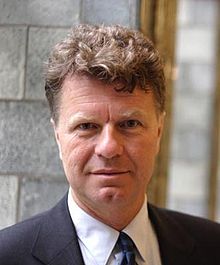Public Lecture by Boris Dittrich: Lesbian, Gay, Bisexual, and Transgender Rights
 Boris Dittrich, a former judge in his native Netherlands and currently the Advocacy Director for LGBT Rights with Human Rights Watch in New York, spoke in favour of Louisa Wall’s bill to define marriage so as to include same sex couples at a recent New Zealand Centre for Human Rights Law, Policy and Practice *, (NZCHR) event.
Boris Dittrich, a former judge in his native Netherlands and currently the Advocacy Director for LGBT Rights with Human Rights Watch in New York, spoke in favour of Louisa Wall’s bill to define marriage so as to include same sex couples at a recent New Zealand Centre for Human Rights Law, Policy and Practice *, (NZCHR) event.
What did the activist and spokeperson on Lesbian, Gay, Bisexual and Transgender Rights have to say?
A summary of his speech:
Equality based on sexuality
Dittrich spoke of his own “coming out” and his decision in the mid-1980s to focus his skills on calling for equality based on sexuality. At that time, he commented, whilst a few Scandinavian countries had started to introduce civil unions, the Netherlands had not. He determined that the “separate but equal” status of civil unions was not adequate.
De-bunking "separate but equal"
It is worth recalling that this was an argument ("separate but equal") used to justify racial segregation in the USA, namely that the separate provision made for African-Americans was just as good as that available to the majority white community and so there was no need for a single provision to which all groups had access.
Marriage without reference to sexuality
Dittrich’s campaign was for the Netherlands to take the lead and introduce legislation to permit marriage without reference to sexuality. By this time, he had moved from a judicial position and had become a politician. He soon achieved majority support in the Dutch legislature, and gained the support of the Prime Minister after making the legalisation of gay marriage a bargaining factor for the formation of the coalition government.
Netherlands became world leader in gay marriage legislation
The legislation passed in the Netherlands and several other countries soon followed, including South Africa, where the reaction to past institutional discrimination created an atmosphere to support the proposal. Various northern European countries have followed, as well as several countries with strong Catholic churches, including Spain, Portugal and Argentina. He noted that Canada and several states in the USA also had similar laws, the latter often the result of majority support at referenda. Dittrich was glad to see that New Zealand had the opportunity to be a relatively early adopter of legislation that was rooted in the obligation not to discriminate.
Campaign against prejudice is far from won
Dittrich also had a warning for the audience that the campaign against prejudice is far from won. He noted that it is still a criminal offence to engage in homosexual conduct in 76 of the 193 members of the United Nations, and recalled that there were numerous instances he had come across during his work for Human Rights Watch where persecution had been meted out to homosexual individuals, even without any finding of proscribed conduct.
There was also, he noted, a movement led by Russia that, under the cover of calling for respect for so-called traditional values, was being used actively to seek to entrench bigotry. Worryingly, noted Dittrich, this has gained support at the UN Human Rights Council, the body designed to be at the forefront of promoting the application of human rights standards.
Support for Yogyakarta Principles
But on the positive side, he also spoke about the Yogyakarta Principles, in which he had a key role, and the support they were gaining. These principles restate existing fundamental rights and explain what they mean in the context of equality for LGBT members of society. Secretary-General Ban Ki-Moon had been staunch in his advocacy for equality on grounds of sexuality (in contrast to his predecessor in the role). The principle advocated by the Secretary-General is that traditional values have their place, but must give way to human rights standards. New Zealand, he noted, had been supportive of these positive moves.
Dittrich also recounted how the Holy See came to issue a statement in support of the decriminalisation of homosexual behaviour: it was asked to do so, and its ambassador to the UN explained that it had not issued such a statement before because no-one had requested!
- Click to listen to a full radio interview with Boris Dittrich on LGBT Rights, bFM (19 Nov 2012)
- Click to follow progress of Louisa Wall's bill to define marriage
* The New Zealand Centre for Human Rights Law, Policy and Practice, (NZCHR) hosts numerous speaker events per year. Each speaker is from a respected human rights organisation and the events are open to the public. Click to find out more and to keep up to date with NZCHR news.